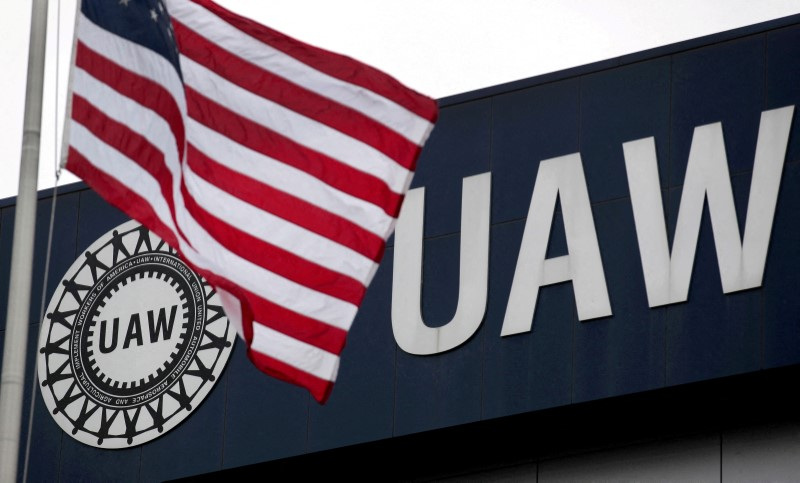
An American flag flies in front of the United Auto Workers union logo on the front of the UAW Solidarity House in Detroit, Michigan, September 8, 2011. Rebecca Cook//File Photo Acquire Licensing Rights
WASHINGTON, Dec 7 (Reuters) – The United Auto Workers union said on Thursday that more than 1,000 factory workers at Volkswagen AG’s Chattanooga, Tennessee assembly plant have signed union authorization cards.
Last week, the UAW said it was launching a first-of-its-kind push to publicly organize the entire nonunion auto sector in the U.S. after winning record new contracts with the Detroit Three automakers.
The UAW, which said 30% of workers at the VW plant had signed cards, has outlined its organizing strategy that says if 30% of workers at a nonunion plant sign cards seeking to join, it would make that public.
If 50% of workers seek to join, the UAW would hold a rally with UAW President Shawn Fain to tout the effort. At 70% and with an organizing committee in place, the UAW would seek recognition or demand a union representation vote.
The Detroit-based UAW said workers at 13 nonunion automakers were announcing simultaneous campaigns across the country to join the union, including at Tesla (TSLA.O), Toyota (7203.T), Volkswagen, Hyundai (005380.KS), Rivian (RIVN.O), Nissan (7201.T), BMW (BMWG.DE) and Mercedes-Benz (MBGn.DE).
Those automakers employ nearly 150,000 workers at their U.S. assembly plants, about the same number as those employed by the Detroit Three companies with which the UAW just signed new labor agreements.
The UAW’s deals with General Motors (GM.N), Ford Motor (F.N) and Stellantis (STLAM.MI) included an immediate 11% pay hike and 25% increase in base wages through 2028, cuts the time needed to reach top pay to three years from eight years and is boosting the pay of temporary workers by 150% and making them permanent.
VW said last month it would hike pay for factory workers in Tennessee by 11%, joining several foreign automakers who have announced significant pay and other compensation improvements in response to the UAW contracts. Many analysts and industry officials saw the move as an effort to keep the UAW out of their plants.
The UAW for decades has unsuccessfully sought to organize auto factories operated by foreign automakers. Efforts to organize Nissan plants in Mississippi and Tennessee failed by wide margins, and two attempts to organize VW’s plant in Chattanooga narrowly failed. In 2019, VW workers at the plant voted 833 to 776 against union representation.
Reporting by David Shepardson; Editing by Chizu Nomiyama
Our Standards: The Thomson Reuters Trust Principles.
